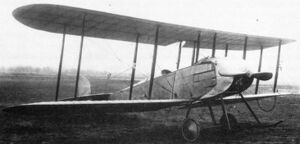Engineering:Royal Aircraft Factory B.E.8
The Royal Aircraft Factory B.E.8 was a British two-seat single-engined general purpose biplane of the First World War, designed by John Kenworthy at the Royal Aircraft Factory in 1913.[1] Small numbers were used by the Royal Flying Corps over the Western Front in the first year of the war, with the type being used as a trainer until 1916.
Development and design
The B.E.8 was the definitive development of the earlier B.E 3 type, and the last of the B.E. series to be designed with a rotary engine. The main changes were that the fuselage now rested on the lower wing, in the normal way for a tractor biplane, and that the tail unit was changed to the B.E.2 pattern. Three prototypes were built at Farnborough with a single long cockpit for both crew members. The production aircraft had two separate cockpits and were built by sub-contractors. The improved B.E.8a of 1915 had new B.E.2c type wings, featuring ailerons instead of wing warping and a revised tail unit.
Operational history
Both models of the aircraft entered service with the Royal Flying Corps and a small number served in France in 1914 and early 1915 but most were used by training units.[2]
Variants
- BE.8
- Production aircraft with wing warping.
- BE.8a
- Production aircraft with ailerons.
Operators
 United Kingdom
United Kingdom
- Royal Flying Corps
- No. 1 Squadron RFC
- No. 2 Squadron RFC
- No. 3 Squadron RFC
- No. 5 Squadron RFC
- No. 6 Squadron RFC
- No. 9 Squadron RFC
Specifications (BE.8)
Data from The Royal Aircraft Factory[3]
General characteristics
- Crew: 2
- Length: 27 ft 4.5 in (8.344 m)
- Wingspan: 37 ft 8 in (11.48 m)
- Height: 9 ft 4 in (2.84 m)
- Wing area: 368 sq ft (34.2 m2)
- Powerplant: 1 × Gnome 7 Lambda 7-cylinder air-cooled rotary piston engine, 80 hp (60 kW)
- Propellers: 2-bladed fixed-pitch propeller
Performance
- Maximum speed: 70 mph (110 km/h, 61 kn) at sea level
- Endurance: 1 hour 30 minutes
- Time to altitude: 3,000 ft (914 m) in 10 minutes 30 seconds
Armament
- Guns: Small arms operated by crew
- Bombs: 1× 100 lb (45 kg) bomb
See also
Related lists
- List of aircraft of the Royal Flying Corps
References
Citations
- ↑ Hare 1990, p. 171.
- ↑ Hare, 1990 p. 174
- ↑ Hare, Paul R. (1990). The Royal Aircraft Factory (1st ed.). London: Putnam Aeronautical. pp. 171–175. ISBN 0851778437.
Bibliography
- Angelucci, Enzo. The Rand McNally Encyclopedia of Military Aircraft, 1914-1980. San Diego, California: The Military Press, 1983. ISBN:0-517-41021-4.
- Bruce, J.M. British Aeroplanes 1914-18. London: Putnam, 1957.
- Bruce, J.M. The Aircraft of the Royal Flying Corps (Military Wing) . London: Putnam, 1982. ISBN:0-370-30084-X.
- Hare, Paul R. The Royal Aircraft Factory. London:Putnam, 1990. ISBN:0-85177-843-7.
- The Illustrated Encyclopedia of Aircraft (Part Work 1982-1985). London: Orbis Publishing, 1985, p. 2819.
 |


